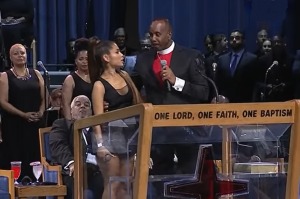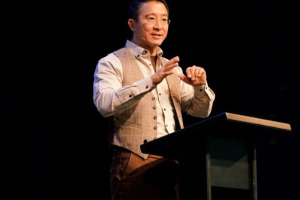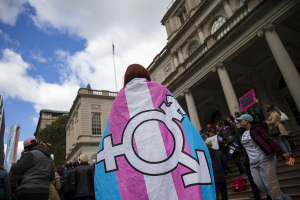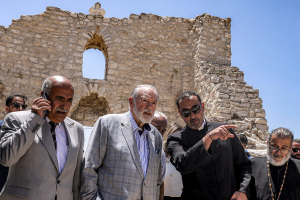'Tsunami of Confusion' Exists on Religious Liberty in Military, Argues Panel
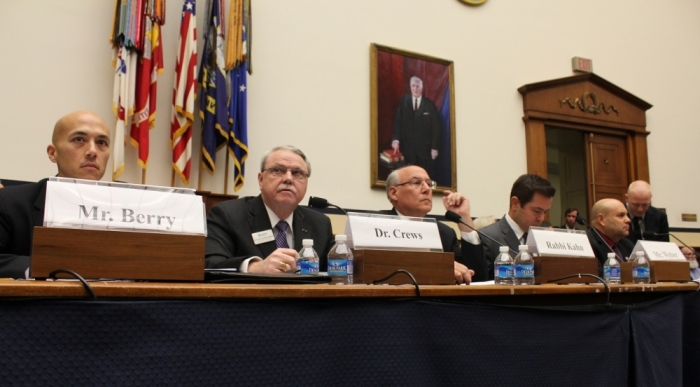
WASHINGTON – A "tsunami of confusion" exists regarding religious liberty in the United States Armed Forces, according to panelists testifying before Congress.
Experts told the panel that the military is caught between a strong desire not to condone or coerce religious doctrine on soldiers and an equally strong desire to protect speech, especially religious speech, in the military.
Representative Joe Wilson of South Carolina chaired the subcommittee and gave introductory remarks before those gathered.
"Historically the Armed Forces have supported religious freedom and accommodated service members' religious beliefs," said Wilson.
"Recognizing that there have been challenges to accommodating religious practices and beliefs, we have engaged in various efforts to clarify the role of religion in the military, prevent religious discrimination, and provide appropriate religious accommodations," said Wilson.
Before Wilson's House Committee on Armed Service's Subcommittee on Military Personnel at the Rayburn Office Building, a five-member panel agreed that confusion undergirds current policies. Mikey Weinstein, president of the Military Religious Freedom Foundation and a supporter of more controls on proselytizing in the military, told those gathered that a "tsunami of confusion" exists on the matter.
Dr. Ron Crews, executive director of the Chaplain Alliance for Religious Liberty and one who supports the freedom to witness in the military, and another panelist giving testimony agreed with Weinstein on the "confusion" point.
In an interview with The Christian Post, Crews said that he believed a lack of education on applying religious freedom in the military was partly to blame: "I think part of the reason is that there's been a lack of education in the field … about pure First Amendment principles and how they now apply in the military.
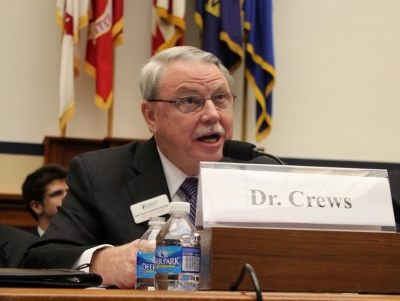
"This is a complex world and our military lawyers and then chaplains need to have more education on the religious liberty issues and exactly how its going to play out with our military today."
Weinstein, on the other hand, believes the problem lies with military leaders who give Christians freedom to share their faith.
"There is also a lot of willful confusion," said Weinstein, adding that "the excuse of 'I'm sorry, I just don't understand' seems very specious. It gets old after a little while when a superior says 'I'm sorry, I just didn't know.' I think they know very well.'"
In addition to Weinstein and Crews, other members of the panel were Michael Berry, senior counsel and director of Military Affairs with the Liberty Institute; Travis Weber, director of the Center for Religious Liberty at the Family Research Council; and retired US Navy chaplain Rabbi Bruce Kahn.
In his written comments, also given before the Subcommittee in person, FRC's Weber spoke with concern about the "censorship" of Christian soldiers that "create a chilling effect" in the ranks. Weber stated that "religion simply cannot be sectioned off into neat little compartments in our lives; it is integral to addressing all aspects of the human experience."
"Let me be clear – we do not support coercing anyone into religious practice. But religious freedom – including the ability to speak of one's religion – must be protected."
The Liberty Institute submitted a written statement wherein they argued that the military had "become increasingly secular during the past several decades."
"The result is that many service members perceive hostility against overt religious expression within the military," continued the Liberty Institute testimony. "Of the many freedoms that our service members voluntarily relinquish upon entering the military, religious freedom is not one."
While the Liberty Institute and FRC focused on the plight of secularism in the military, other groups commented on the rights of non-theist and humanist soldiers. Roy Speckhardt, executive director of the American Humanist Association submitted testimony about the state of religious liberty for those who identified as "humanist."
"We are encouraged by the recent news that the Army is permitting humanism to be used as a stated religious preference, and other changes in the military give us hope that the plight of humanists and other nontheists will soon be fully addressed," stated Speckhardt.
"Unfortunately, humanist service members are often subject to religious proselytization, and find their own needs being ignored by a military administration that is apathetic towards the struggles of these men and women."
Jason Torpy, president of the Military Association of Atheists & Freethinkers, submitted testimony that in part argued for the need to recognize humanist soldiers and the need for humanist chaplains.
"This hearing is evidence that the military cares very much about the moral fiber and foundation of our service members," stated Torpy. "One important question is whether an ethical foundation not based on a god will be given equal treatment."
Regarding the subcommittee meeting held Wednesday afternoon, Weinstein told CP afterward that he considered it to be a "charade" that was a "despicable example of Christian exceptionalism and supremacy."
"It is sad to see lawmakers so incredibly misinformed," said Weinstein, "there is stupidity and then there is willful stupidity."
Regarding the confusion over religious freedom in the military, Weinstein told CP that he believed it was "intentional" and the product of a "fundamentalist Christian para-church military corporate congressional proselytizing complex."
















